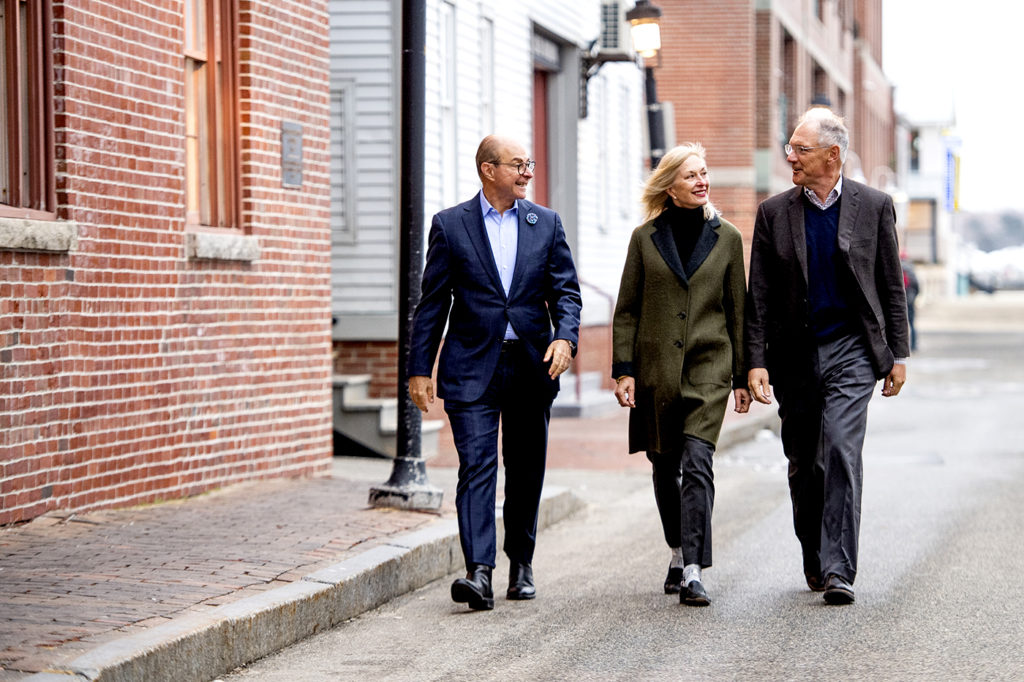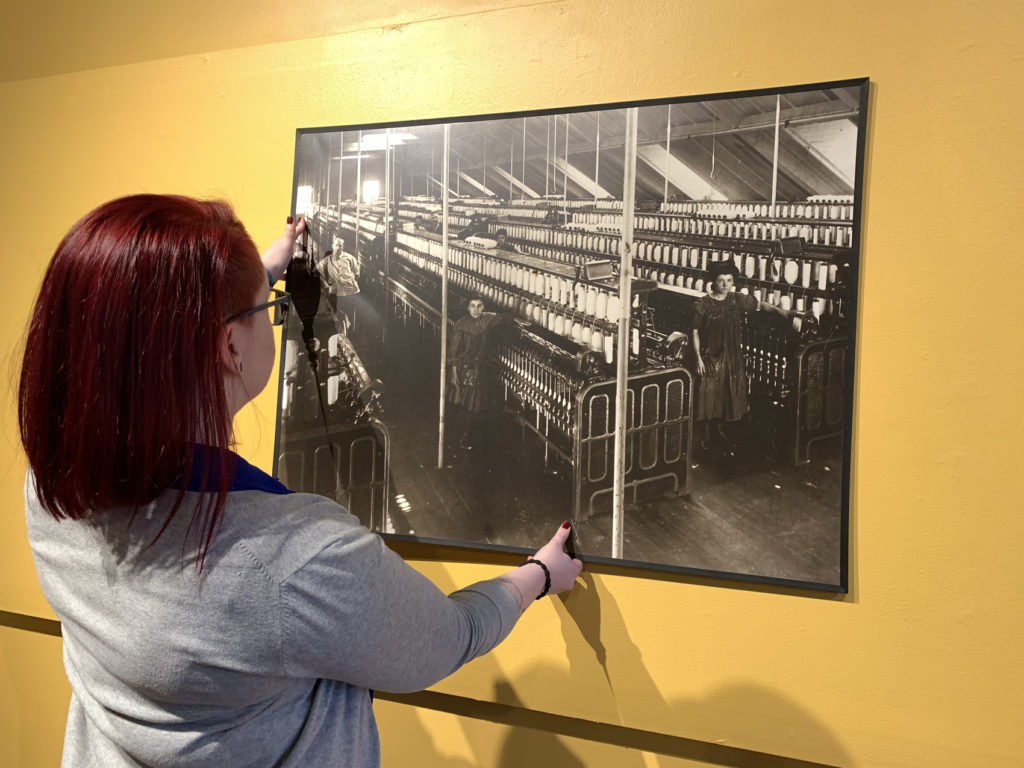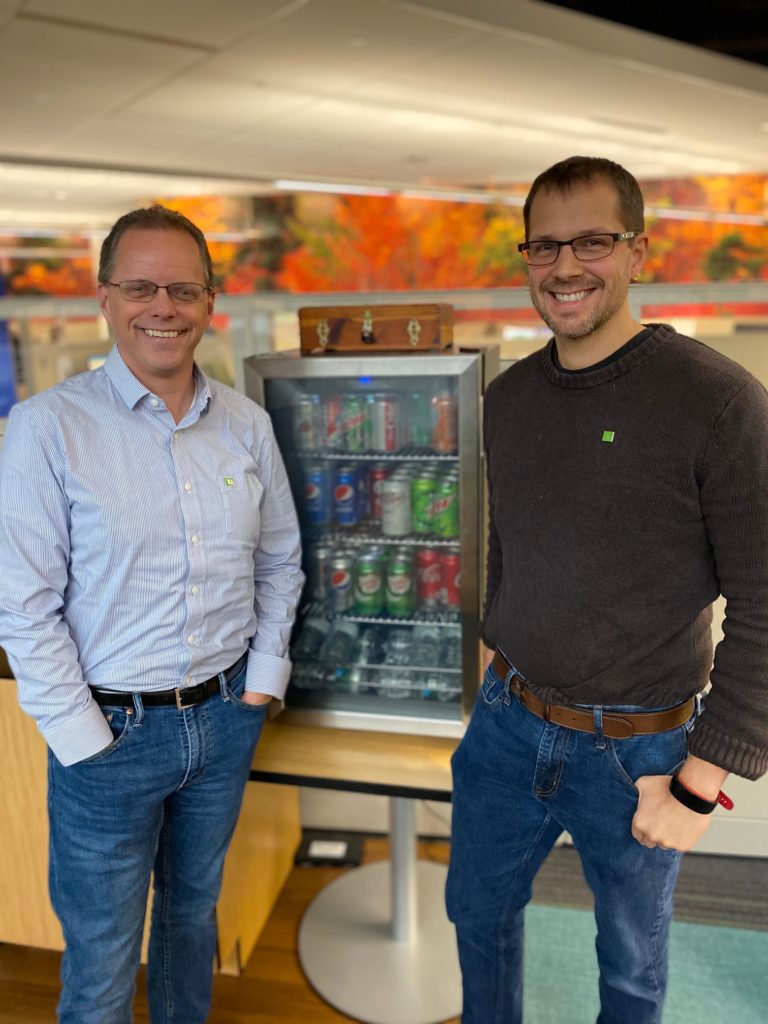Archive for January 2020
Northeastern partners with entrepreneur David Roux

Building upon a decade of expansion through a network of campuses in the U.S. and beyond, Northeastern University, joined by technology entrepreneur David Roux, is launching a graduate education and research campus in Portland, Maine.
The Roux Institute at Northeastern University is designed to educate generations of talent for the digital and life sciences sectors, and drive sustained economic growth in Portland, the state of Maine, and northern New England.
The venture was envisioned by David and his wife Barbara Roux to benefit his native state. Inspired by Northeastern’s leadership in preparing citizens for the societal challenges posed by rapid advances in technology, the couple has invested $100 million in the university to support the Roux Institute’s future activities.
The Roux Institute, scheduled to open in the spring, will partner with leading employers in Maine and across the United States. Its graduate degree and certificate programs will focus on the practical application of artificial intelligence and machine learning in the digital and life sciences to prepare people for high-demand jobs and drive research that meets industry needs—goals that the Rouxs have been pursuing for years. The Roux Institute will not offer undergraduate degrees.
“The entire Northeastern community is grateful to Dave and Barb Roux for their vision and for this transformational investment in the future of Maine,” said Joseph E. Aoun, president of Northeastern. “Their vision is in perfect alignment with Northeastern’s distinctive approach to education and research. The impact of the Roux Institute will reverberate across the region for generations to come. It will serve as a national model for expanding growth and innovation, and reducing inequality.”
Ten leading companies have signed on to become founding partners, which will enable the Roux Institute to quickly help people in the workforce adapt to changes created by the evolving economy.
“In this country, ambition and ability are broadly distributed, but opportunity is not,” said Roux, a native of Lewiston, Maine, who is chairman of BayPine, a private investment company, and co-founder, former chairman and co-chief executive officer of Silver Lake, the world’s largest technology-focused private equity firm. “This new institute will address that stark disparity. It will be an opportunity machine for Maine’s people and businesses at precisely the right time. And Northeastern is the ideal academic partner to make that happen. We could not be happier that the university is joining us in this mission.”
The mission of the Roux Institute is at the heart of the university’s strategic plan, Northeastern 2025—a blueprint for lifelong and experiential learning that liberates students from outdated career models and gives them the opportunity to prosper over the course of their lives.
The Roux Institute will make use of Northeastern’s collaborative strengths across the board—a combination of online and in-person learning for students, with a research program that creates new ideas that allow companies to thrive and grow.
The Roux Institute’s curriculum will be developed in close collaboration with the corporate partners. Research teams will be supported by world-class facilities and technology, fulfilling the Rouxs’ dream of creating an innovation and life-sciences corridor that stretches from Boston to Portland and beyond.
Founding corporate partners include: Bangor Savings Bank, the second-largest bank in Maine; IDEXX, a leader in pet healthcare innovation that provides veterinary products and services around the world; The Jackson Laboratory, an independent, nonprofit biomedical research institution based in Maine that has facilities in Connecticut, California, and Shanghai, China; L.L. Bean, an internationally recognized outdoor retailer; MaineHealth, the largest healthcare organization in Maine; PTC, a global software company with 6,000 employees in 30 countries; Thornton Tomasetti, a New York-based engineering consulting firm that has designed several of the world’s tallest buildings; Tilson, an international provider of network deployment and professional services to telecom, construction, utility, and government clients; Unum, a Fortune 500 company that provides benefits to employees of 193,000 businesses internationally; WEX, a global leader in financial technology that serves millions of companies.
The corporate partners have agreed to collaborate with the Roux Institute on educational and research offerings; sponsor and fund participation by employees who demonstrate high potential for advanced educational offerings; fund applied research projects and innovation initiatives; and establish innovation labs at the institute where faculty and industry experts can work together on projects.
The initial program portfolio will cover two broad disciplines: In digital technology, curricula will include applied analytics, computer science, data science, data visualization, and machine learning; in advanced life sciences, subjects will cover bioinformatics, biotechnology, genomics, health data analytics, and precision medicine.
Portland, the largest city in Maine with a metropolitan population of more than 500,000, features a growing tech economy, affordable real estate, and ready access to transportation.
“The Roux Institute represents a significant expansion of our model,” Aoun said. “In the past, we have founded campuses initially focused on lifelong learning, such as Seattle, and other campuses initially focused on research, such as Burlington. This is the first campus that integrates these two models from day one.”
For media inquiries, please contact Shannon Nargi at s.nargi@northeastern.eduor 617-373-5718.
Maine’s Alzheimer’s and Dementia Advocacy Day

The Alzheimer’s Association is hosting Maine’s Alzheimer’s & Dementia Advocacy Day on Thursday, January 30 from 9 a.m. to 12 noon at the Hall of Flags on the second floor of the State House in Augusta. All Maine residents are welcome to attend. This day of state advocacy is designed to enable those affected by Alzheimer’s or other dementias to share their experiences face-to-face with state elected officials and influence them to address the economic impact of the Alzheimer’s epidemic and the care and support needs of Maine families. New data about cognitive decline in Maine from the Behavioral Risk Factor Surveillance System (BRFSS) will be presented at a press conference at 11:30 a.m.
Alzheimer’s Association volunteer advocate Denise Kinney of Biddeford is living in the early stages of dementia. She explains, “This isn’t just happening to me, there are many Mainers walking around like this. These statistics are frightening. I am part of that number and I will be facing much greater challenges.” Kinney continues, “When I went public with my diagnosis, it was largely to increase awareness and to stamp out the stigma attached to the disease. I worry about my future, not for myself, but for my sons. Let’s do the right thing for all the people of Maine living with Alzheimer’s and dementia.”
In Maine there are 28,000 people living with Alzheimer’s and 69,000 friends and family providing more than 79 million hours of unpaid care valued at $998 million. In addition, more than half of all adults providing unpaid care to loved ones with dementia have been doing so for at least two years. MaineCare’s costs of caring for people with Alzheimer’s in 2019 was $205 million and is projected to increase by more than 36% by 2025. Nationwide, Alzheimer’s care is the country’s most expensive condition.
“We encourage Mainers who want to show their support of Maine families affected by dementia to join us,” explains Adam Lacher, Director of Advocacy at the Alzheimer’s Association, Maine Chapter. “Personal stories carry the power to motivate our state officials to combat the Alzheimer’s crisis and effect positive change.”
Featured speakers include: Laurie Bowie, Executive Director, Alzheimer’s Association, Maine Chapter will serve as the emcee; Nirav D. Shah, M.D., J.D., Director of the Maine Center for Disease Control and Prevention (Maine CDC) will give an update on the state’s Healthy Brain Initiative work and the latest results from the 2018 Cognitive Decline BRFSS analysis; Rep. Margaret Craven and Rep. Kristen Cloutier will discuss why they are Alzheimer’s and dementia legislative champions; Dr. Gareth Howell, Associate Professor, The Jackson Laboratory will give an Alzheimer’s research update related to risk reduction; Denise Kinney, Advocate, Alzheimer’s Association, Maine Chapter will share her experience living in the early stages of dementia.
Several community partners will join the Alzheimer’s Association including: Association for Frontotemporal Degeneration, The Jackson Laboratory, Legal Services for the Elderly, Long Term Care Ombudsman, MaineHealth, Northern Light Acadia Hospital, and University of New England.
The Alzheimer’s Association is the leading voluntary health organization in Alzheimer’s care, support and research. Our mission is to eliminate Alzheimer’s disease through the advancement of research, to provide and enhance care and support for all affected, and to reduce the risk of dementia through the promotion of brain health. Our vision is a world without Alzheimer’s. Visit alz.org or call 800.272.3900.
Mark Turcotte to record debut comedy album at Craft Brew Underground

Maine Event Comedy presents Lewiston’s Mark Turcotte in his debut album recording “Live in L-A” at Craft Brew Underground, Friday, January 31 at 8 p.m. The show will also feature Nic Dufault, Leonard Kimble, and Dee Turcotte-Caouette.
Turcotte began performing stand-up in 2012 and founded Maine Event Comedy in 2015. He was a finalist in the Funniest Comic on the East Coast Contest at Mohegan Sun and a semi-finalist at the World Series of Comedy in Sarasota, Florida. He was also part of the Gotham All-Stars Show in New York City and selected for the Boston, Cleveland, and North Carolina comedy festivals. Most of his material is mined from his family life, an adult-like curiosity, and a series of misfortunes.
The show is for ages 21-and-older; admission is pay-what-you-can. Craft Brew Underground is located at 34 Court Street in Auburn. It was voted the No. 1 Craft Beer Bar in Maine and offers more than 200 choices of craft beer, cider, and wine.
For more information, call/text (207) 513-0742 or email maineeventcomedy@gmail.com.
Governor Mills: High-speed internet is no longer a luxury, it is a necessity.
In my first State of the State address as Governor this week, I told the people of Maine, you watching in homes, businesses and shops across the state and listening this morning, that our economy is on a solid footing and it is growing.
Revenues are up, our gross domestic product is up, housing starts, construction, auto sales are all up and the state budget continues to have a healthy surplus. The private sector created 5,300 new jobs this past year. My Administration helped 800 people with disabilities find and keep jobs. Our unemployment rate went down, we paid off the $80 million debt for the Riverview Psychiatric Center and we stopped the bleeding of interest payments to the federal
My Administration added $30 million to the Budget Stabilization Fund, for a total of $237 million – and I am proposing to add another $20 million more.
And, on a bipartisan basis, we provided $75 million in property tax relief for Maine people — just look in your mailbox, about 300,000 of you should receive a $104 check.
While all this is progress, it is also important to address the challenges that still loom large over our economy. We are not taking anything for granted and we look at the future with cautious optimism.
Our State’s ten-year economic development plan says if we want to strengthen our economy, we have to enhance critical infrastructure, including broadband, particularly in rural Maine.
We all know the problems with internet – slow internet and no internet. This company, DesignLab, for instance, a marketing and design firm in Millinocket, used to upload their video files on a hard drive, drive to the Medway gas station, and ask a bus driver to deliver the files to a video editor in Presque.
Internet speeds were dismal for them, and it severely limited their productivity. But now, with broadband in Millinocket, they are succeeding.
You know, as one small businessperson put it to me the other day, “You want to grow the economy?” she said, “Give us better internet.”
It is time for us to listen. High-speed internet is no longer a luxury, it is a necessity.
Increasing access to high speed internet will allow our businesses to expand and allow people across the state to connect with schools, with health care providers and with markets around the country and around the world.
I am proposing that the Legislature fund $15 million this year to expand broadband for Maine people and Maine businesses. We just can’t afford to wait any longer.
More than 100 communities across Maine have worked with their local hospitals, schools, businesses and providers to identify how they can bring better internet to their towns. They are ready to go for broadband – the only thing they are waiting for now is funding.
Some state funding, along with private and federal investments, can bring internet to the most rural communities Maine, and this initial investment of state funds is long-overdue and very important.
Please join me in asking your state representatives and your state senators in the Legislature to support investments in broadband.
It’s an investment in our economy and in your success.
Auburn Winter Festival 2020

Auburn’s Annual Winter Festival will begin on Friday, January 24 and will run all weekend long, through the 26! A full list of events can be found at www.auburnmaine.gov or by calling 333-6611. This event is Auburn’s celebration of all things winter! Highlights include:
Friday/Saturday/Sunday: The Auburn PAL Center at 24 Chestnut Street will have a snow playground, which will be available during daylight hours for children to climb & enjoy!
Friday Night: During “Family Fun Night at the Mountain,” Lost Valley will host various activities for the whole family. The ever-popular Torchlight Parade and Fireworks will take place at 9 p.m.
Saturday Night: The Twin City Thunder will have back-to back hockey games (NCDC & Premiere) at 4 & 7 p.m. For tickets, visit www.twincitythunder.com.
Sunday: United New Auburn Association will host a family sledding/skating/showshoesing event at Sherwood Heights School from 11 a.m. to 2 p.m. Baxter Outdoor’s Packed Powder Series at Lost Valley will feature a solo 5km snowshoe, solo and team 10km duathlons starting at 9 a.m. East Auburn Baptist Church will offer snow shoeing and dog sled rides, with 100 beautiful acres to explore, plus a warming hut with hot chocolate and coffee!
These are just a few highlights for WinterFest 2020! Visit www.auburnmaine.gov for more.
Museum L-A’s newest exhibit: “All work and No Play”

Opening January 30, Museum L-A’s newest gallery exhibit,
“All Work and No Play”, delves into a grim part of America’s
industrial labor history. The exhibit explores the historic use of
children as laborers in industries such as textile mills, sardine
canneries, and family farms throughout the state of Maine, in an
effort to understand how child labor became a widespread issue in the
United States. By using information about the working conditions of
these young workers and the decades of labor reform, the museum will
present a well-rounded understanding of the subject rather than place
blame on the industries described.
Child labor has been a consistent topic for educational tours at the
museum since its opening. Many teachers, especially those with younger
students, request that their tours provide information about
children’s roles in textile mill operations as a way to open the eyes
of newer generations and highlight how different their way of life is
compared to that of their ancestors. The museum has created numerous
lesson plans and educational materials relating to this topic, but
this is the first time a full-scale exhibition will be installed in
the gallery to showcase the experiences of this underrepresented
sector of the workforce.
“With the negative connotation of the use of child labor in textile
mills in other parts of the country and the world, visitors to the
museum often ask about whether or not children worked at the Bates
Mill,” Emma Sieh, Museum L-A’s collections and exhibits coordinator
explains. “We thought it was time to address this difficult topic and
help our visitors understand the reality of what it was like to be a
child laborer historically, in the hopes of starting new and important
discussions about its practice today.”
The new exhibition was curated not only to reflect on the use of child
labor in the Lewiston-Auburn area, but on its use in industries
throughout Maine. Photographs and collections from six historical
organizations with locations throughout the state will be featured as
a way to share each region’s labor history during Maine’s Bicentennial
year. The original Lewis Hine photographs taken at the turn of the
century to persuade the American public to abolish the practice of
child labor and historian Joe Manning’s genealogical research into the
identities of the children in those photographs as part of his ongoing
Lewis Hine Project will also be featured. “These photographs were
crucial to changing social attitude and enacting child labor laws in
our country,” notes Audrey Thomson, executive director of Museum L-A.
The public is invited to attend the free opening reception for the
exhibit from 6 to 8 p.m. Thursday, January 30. Visitors will be able to
explore the exhibit and enjoy light refreshments.
“All Work and No Play” will be on display in the Museum L-A gallery
through mid-June 2020. Prior to the closing of the exhibition, the
museum will host a capstone event as a place to discuss and understand
how the use of child labor historically can still affect popular
opinion about its worldwide use today.
Museum L-A is located in the Bates Mill Complex at 35 Canal Street in
Lewiston, Maine. Its hours of operation are Tuesday through Friday
from 10 a.m. to 4 p.m. and Saturdays from 10 a.m. to 3 p.m. Special
tour requests and large group tours outside of these hours are
available by appointment. For more information, please contact info@museumla.org or call 207-333-3881.
Emma Sieh, collections and exhibits coordinator at
Museum L-A, installs one of the reproduction photographs of children
working in the textile mills in the gallery for the upcoming child
labor exhibit “All Work and No Play” that opens January 30. The
reproduction is on loan from the USM Franco American Collection.
Out and About with Rachel Morin: Cole Farms in Gray closing article

Photo and story by Rachel Morin
I joined hundreds of customers going to Cole Farms in Gray for a nostalgic and sad farewell to a family restaurant that has been a landmark in Gray since it opened nearly 70 years ago.
It was Saturday, January 11, and the place was packed when we arrived for breakfast. Owner Brad Pollard was 10 years old when his family opened the restaurant, and this is the only home he knows. He grew up in the business. He now mingled with his customers arriving at the restaurant. He approved this article but shied away from a photo.
Sad news of the closing came last month when Brad sent a letter informing customers, friends and the public that Cole Farms would be closing Monday, January 13. It was a hard and painful decision, but a necessary one, due to rising costs and the inability to continue the excellent service and delicious home cooked comfort meals he had provided all these years. Gratitude and appreciation were expressed in the letter to his faithful customers and the public for the successful thriving business Cole Farms had been.
My long association with Cole Farms goes back many years and has been full of enjoying the comfort food meals and home baked pastries. Who could forget their home baked pies? My husband (Gerry) and I would travel the old Lewiston Road to Cole Farms often from our Auburn home.
These trips increased when my adult children moved to Portland. When the grandchildren started coming, the trips increased dramatically. Gerry and I would still travel the old Lewiston Road to Portland, enjoying the peaceful, picturesque country drive, with slower paced two lane driving and avoiding the faster traffic on the turnpike. We would stop at Cole Farms on the way to Portland and stop again on our way back to Auburn.
After Gerry died, I still travelled the same route to Portland, stopping at Cole Farms on the way, and again on the way back to Auburn. It’s a sweet memory I cherish of my husband and me visiting Cole Farms and welcoming our growing family of grandchildren in Portland.
As I walked around Cole Farms on this Saturday morning, I marveled at all the customers eager to talk amongst themselves and to me about their fond memories of Cole Farms, and what they were going to miss. It seemed therapeutic for them to talk about their sadness and share it with friends who felt the same way. It was the same sentiments among all these people, some from Gray, and many from surrounding towns–they all felt the same nostalgia, similar memories and how much the restaurant meant to them and what they would miss.
Many old-time patrons also expressed the friendly and homey atmosphere they felt at Cole Farms, with their fellow customers, as well as with the staff. Some had formed friendships over the years. No one was a stranger, and all were made to feel welcomed. Customers noticed I was walking around with my camera taking pictures. They were pleased to pose for pictures for the story in Twin City Times.
And so, at the end of the long morning visit, we all said a sad goodbye to Cole Farms, a landmark in Gray.
Auburn Ski Association scholarships awarded

Congratulations to 2019 Edward Little High School graduates Christian Beliveau and Annabelle Soucie, who each received a $500 Auburn Ski Association Scholarship at Lost Valley recently.
Christian Beliveau is attending the University of Maine at Farmington and is enrolled in the Elementary Education program. While at Edward Little, he earned an A average while taking a mixture of honors and college preparatory courses. He was very involved in the Edward Little community, as well as a three-sport athlete. Christian was the captain of the varsity soccer team, the alpine racing team, and the baseball team. He is dedicated, hardworking and always leads by example.
Annabelle Soucie is attending the University of Maine at Orono, is enrolled in the Electrical Engineering Technology program, and received the University of Maine Pulp and Paper Foundation Scholarship. While at Edward Little, Annabelle was a member of the National Honor Society for two years and served as the Treasurer her senior year. She was involved with the alpine skiing and lacrosse teams, serving as captain of the alpine skiing team her senior year. Annabelle is also a life-long member of the Girl Scouts.
The annual ASA Scholarships are announced at the June graduation, and are awarded after the recipients successfully complete their first semester of college. Auburn Ski Association provides financial support for Alpine and Nordic race programs at Edward Little High School and the Auburn Middle School, as well as organizations such as the Lost Valley Racing Club and the Merrick Chadbourne Learn-to-Ski and Ride Program at Lost Valley. To learn more about Auburn Ski Association go to auburnskiassociation.com, www.facebook.com/AuburnSkiAssociation,info@auburnskiassociation.com, or call Kevin Arel at 786-3430.
Governor Mills: “Made for Maine Health Coverage Act” will improve health insurance
Campaigning across the state in 2018, I met so many people worried that they’ll never be able to afford health care.
Small business owners bracing for unpredictable hikes in costs for the health insurance their employees all need to stay healthy and stay working.
Seniors who are rationing prescription drug medications – or worse, going without because of the high costs.
From Abbot to York to Baileyville and Winslow and every town in between, the most common thing keeping Maine people up at night is the cost of health care.
I remembered these people when, on my first day in office over a year ago, we expanded MaineCare by Executive Order. More than 57,000 people now have accessed life-saving health care coverage.
I remembered them when last session we enacted LD 1 to protect coverage regardless of pre-existing conditions and ensure that Maine people have necessary mental health, pediatric care, maternal care and substance use disorder treatment.
I remembered them when we enacted a comprehensive prescription drug package to make prescription drugs more affordable and when we restored the Maine Drugs for the Elderly Program that serves 1,800 more seniors in the biennial budget.
While we have made substantial progress in expanding access to health care, our health insurance system is still confusing, difficult to use, and so expensive.
Thousands of Maine people who do have health insurance are falling through the cracks every day just trying to navigate the system. Not only that, but then they got to afford the health care they need to live, work and raise their families in Maine.
Maine’s small businesses and self-employed people are struggling to cope with ever-increasing costs to provide health care coverage.
For these reasons, I have introduced legislation, sponsored by Senate President Troy Jackson and Speaker Sara Gideon, to improve health insurance for Maine people and small businesses – all without any state tax dollars.
This bill is called the “Made for Maine Health Coverage Act” because it sets Maine-specific deductibles and copays, it offers a Maine solution for small businesses, and it creates a Marketplace designed to best meet the needs of Maine people.
Among other things, the bill requires health plans to cover the first primary care visit and behavioral health visit each year for free – with no deductible, no co-pay, and no out-of-pocket costs. The second and third primary care or behavioral health visits could have a co-pay, but the deductibles would not apply.
This bill will also allow Maine people to shop for and compare plans by creating “clear choice designs” — health plans with the same deductibles, copays and out-of-pocket limits for the most commonly used services.
Maine’s small group market has seen increasing premiums and decreasing enrollment, making it very difficult for small businesses to offer coverage to their employees.
Our bill will pool insurance plans and premiums for individuals and small businesses, creating a combined, larger and more stable pool of enrollees to stem increasing costs.
The bill will also extend reinsurance for the first time to small businesses – that’s the program that helps insurers cover the patients who need the most expensive treatments – to lower their premiums. It’s funded by the federal government and by current fees in Maine’s reinsurance program.
These two provisions of the Made for Maine Health Coverage Act will take effect only if we determine that they will in fact stabilize and reduce small businesses’ monthly premiums.
The bill will also move Maine toward a State-Based Marketplace. That means Maine will conduct its own education, in-person consumer assistance, and outreach on coverage – putting us in the driver’s seat when it comes to helping Maine people learn about options and sign up for health care.
This move is more important than ever before, with legal and political challenges every day to the Affordable Care Act and to the health care that thousands of Maine people rely on.
While MaineCare expansion, LD1 and the prescription drug reform package have helped thousands of Maine people by giving them access to health care and strengthening their health care protections, the Made for Maine Coverage Act is another important step forward in improving Maine’s health care system for our people and for our small businesses — all without any state tax dollars.
We are anticipating bipartisan support for this bill and I look forward to hearing from you and to working with the Legislature to enact it.



